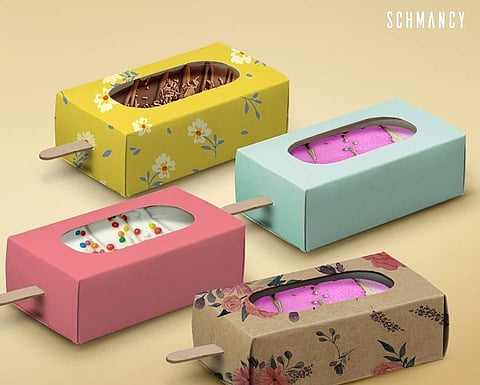

Do you think twice about the amount of plastic you are consuming when you order a meal on Swiggy or Zomato each day? Or when you order a product online? Maybe you should, with all the talk about ban on single-use plastics. Several studies have shown that single use plastics, especially the containers we get take-out in, contain harmful chemical compounds like bisphenol A, commonly known as BPA, a colourless solid that is soluble in organic solvents. This compound is known to migrate to food substances that are kept in plastic containers and result in endocrine disorders — infertility, thyroid, obesity, etc.
However, there are ways you can use environment-friendly packaging and well, contribute less towards pollution. This start-up in Bengaluru is here to help you with that. Called Schmancy, this start-up provides packaging solutions using recycled paper to businesses so that they can deliver their products in a sustainable manner. Started by Nikhil Parekh (32) in 2015, Schmancy came into being as he realised that the opportunity in custom packaging was vast yet untouched when a few of his friends who are bakers and restaurant owners showed disappointment over the unavailability of specific sizes. Schmancy has been supplying the awesome packaging for big names like Curefit, Swiggy, Chai point, Hatti Kappi, Smoke House Deli, Olive Bar & Kitchen and more in the food sector. While in others they supply to Popsocket, Zivame, Buttercups and more.
Nikhil, a former software engineer, began helping his friends with paper-based packaging as they were starting their small scale bakeries or businesses. "My family was already in the packaging business and we used to provide packaging for industrial supplies and deal with plastic packaging. I worked there till 2012. Then 2013, when my friends came to me for small quantity packaging, I realised that there's a need. Over time I realised that the number of people who require this kind of packaging is a lot. Nobody wants 5000-10,000 boxes as it's an initial investment of almost Rs 50,000, which is a huge amount to invest for a small company. Thus, Schmancy was set up to provide a solution to this. We launched the company full-time officially in 2016," says Nikhil.
All for Sustainability
Schmancy is all about the little guy. The idea is to provide the same high-quality sustainable packaging even in smaller quantities. "The kind of packaging that people use are more/less standardised, if we can customise or provide a branding opportunity then the packaging becomes closer to whichever place or brand it is for. We also provide plastic packaging, which is all bio-degradable. Once the raw materials for our boxes is procured, they are then sent for customised printing and later assembled at our unit in Peenya in Bengaluru," he adds.
The packaging that the start-up deals with is mainly divided into two categories of items – food and goods. The packaging for food is FSSAI certified and is made from paper which is produced keeping in mind the minimal wastage of resources. While, on the other hand, the boxes for goods are made from recycled paper boards. All of this is FSC (Forest Stewardship Council) certified, says Nikhil, which means that it has been responsibly produced.
Challenges along the way
Nikhil explains that everybody has a different requirement, however, standardised packaging — like a box used by a jeweller — can also be used by a mobile phone accessories brand, which people still don't understand. "They had to be shown how to do this, that is where we came into the picture. From a manufacturing point of view this is how we gained our numbers, we manufactured in bulk and then divided it and showcased, marketed it so that everyone can use it. This was one of the challenges we faced initially," he says.
The other evident challenge was to get people to understand the need for sustainability. "For them it's all about pricing. Plastic has been there for so many years that it has become one of the most versatile and cheapest materials. If we give out these options and give it some time to be a part of the system, then in 3-4 years we will be able to completely replace plastic. The challenge here is to get the consumers to accept this. There's already been a shift in the past 2-3 years, we need more people to adapt to it. People are starting to pay for it now. It is happening at a slow pace but this shift is needed," he says.
What sets them apart?
There are three legs to what Schmancy does — quality of the product, design angle, and third is the service. There are a lot of food delivery services but not all are packaged in a sustainable manner, not certified food grade, which is where this start-up comes in. Everything is tested and certified. "We are acting as consultants. When they don't have an option people just buy 5000 units of a packaging material but what if that is not used and it ends up in the trash? Even when the paper is recyclable, it does not stop waste generation. What we do is we combine those orders, aggregate orders from different people, and the 5K boxes which would have gone waste for one person will be used and divided among 10 people. This reduces your carbon footprint and brings about a reduction of usage of resources, which is the whole point of the company," he says.
What lies ahead
Schmancy wants to produce more reusable and sustainable packaging by using natural material like wheatgrass, sugarcane, bamboo and increase sustainability as a company. "We want to be more of a solution provider, a one point contact for such packaging. In India this industry is growing because of the boom in the food delivery sector, if we don't adapt sustainable packaging, the amount of plastic dump ending up in landfills is going to be huge in the country," Nikhil concludes.
